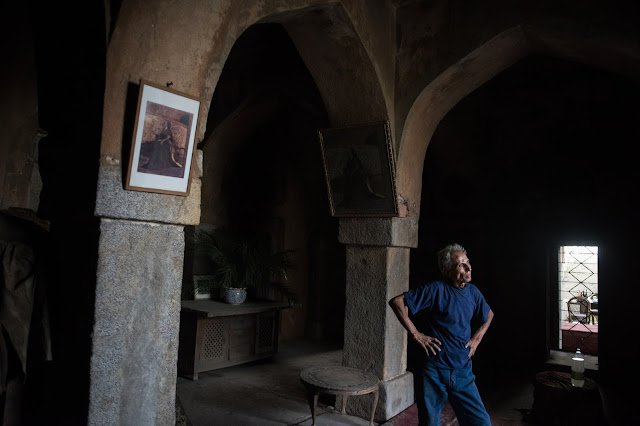One loud cheer for the 'fake news' New York Times
The New York Times, widely regarded the best paper in the U.S., if not the world, for the breadth and depth of its news coverage, has come under incessant attack by President Trump, and his millions of followers, as a nefarious purveyor of "fake news."
We hear that the Times' news coverage is tendentious, if not downright false, made-up stuff. Lies, damn lies, that distort the accomplishments of the Trump administration. Lies so outrageous, it's best to dismiss the Times as "fake news," the same way you wouldn't bother reading the official newspaper of the the Communist Party of Cuba.
And if you follow that advice, you'll be missing some of the best newspaper writing around.
Aside from news, the Times regularly digs up some amazing stories, such as Friday's "The Jungle Prince of Delhi," a tale so amazing, and so amazingly well reported and written, at first it strikes you as fiction, perhaps a latter-day sample of "magical realism" writing, in the style of García Márquez or Isabel Allende, with characters and settings that defy credulity, even though, in this case, they are all real. Or who, at first, seem to be real.
It's the story of a mother, and her son and daughter, who until recently lived in a 14th century hunting lodge located in an almost impenetrable jungle in the middle of New Delhi, a city of more than 20 million.
They claimed to be descendants of Muslim Shiite royalty, and effectively mounted a sit-in protest in the VIP lounge of the Delhi train station, demanding to be recognized as such by the Indian government.
It was a bizarre, deluxe protest to which they brought carpets, potted plants and attendants, and which lasted for about ten years. "Indian Princess Reigns in Railway Station," a Times reporter wrote in 1981." By now you're shaking your head.
That's just the beginning of the story, on which the reporter worked on for years, and which took her for interviews with relatives in Britain, Pakistan and phone conversations with someone in Texas. I won't say more because I don't want to disclose the ending.
The story was arresting, touching and moving but not sappy, like so many "human interest" stories about, say, someone missing a leg and an arm, and against all odds, is training for the Boston marathon.
An online version of the Washington Post seems to specialize in those stories, which are supposed to inspire but have instead come to bore the hell out of me. Maybe I'm jaded.
Best of all, the tale of the Cyrus, the Jungle Prince of New Delhi, and his family, was a welcome departure—an escape— from the numbing rat-tat-tat of news about Trump, impeachment and who-said-what-to-whom.
It was like riding on a magic carpet for a visit to a mythical kingdom that once upon a time was real, or so it seemed.
We hear that the Times' news coverage is tendentious, if not downright false, made-up stuff. Lies, damn lies, that distort the accomplishments of the Trump administration. Lies so outrageous, it's best to dismiss the Times as "fake news," the same way you wouldn't bother reading the official newspaper of the the Communist Party of Cuba.
 |
| Prince Cyrus in his decrepit realm in the middle of New Delhi. |
Aside from news, the Times regularly digs up some amazing stories, such as Friday's "The Jungle Prince of Delhi," a tale so amazing, and so amazingly well reported and written, at first it strikes you as fiction, perhaps a latter-day sample of "magical realism" writing, in the style of García Márquez or Isabel Allende, with characters and settings that defy credulity, even though, in this case, they are all real. Or who, at first, seem to be real.
It's the story of a mother, and her son and daughter, who until recently lived in a 14th century hunting lodge located in an almost impenetrable jungle in the middle of New Delhi, a city of more than 20 million.
They claimed to be descendants of Muslim Shiite royalty, and effectively mounted a sit-in protest in the VIP lounge of the Delhi train station, demanding to be recognized as such by the Indian government.
It was a bizarre, deluxe protest to which they brought carpets, potted plants and attendants, and which lasted for about ten years. "Indian Princess Reigns in Railway Station," a Times reporter wrote in 1981." By now you're shaking your head.
That's just the beginning of the story, on which the reporter worked on for years, and which took her for interviews with relatives in Britain, Pakistan and phone conversations with someone in Texas. I won't say more because I don't want to disclose the ending.
The story was arresting, touching and moving but not sappy, like so many "human interest" stories about, say, someone missing a leg and an arm, and against all odds, is training for the Boston marathon.
An online version of the Washington Post seems to specialize in those stories, which are supposed to inspire but have instead come to bore the hell out of me. Maybe I'm jaded.
Best of all, the tale of the Cyrus, the Jungle Prince of New Delhi, and his family, was a welcome departure—an escape— from the numbing rat-tat-tat of news about Trump, impeachment and who-said-what-to-whom.
It was like riding on a magic carpet for a visit to a mythical kingdom that once upon a time was real, or so it seemed.

Comments
Post a Comment
Let us hear your opinions, thoughts and comments